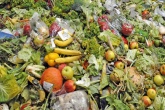Morrisons food waste figures reveal 11k tonnes of unnecessary waste
UK supermarket chain Morrisons has published its food waste figures for the first time, revealing in an announcement on Wednesday (16 May) that 11,000 tonnes of food went to waste from its stores in 2017/18.
Food waste remains an important issue in the UK, with the Waste and Resources Action Programme (WRAP) reporting that £13 billion of edible food is thrown away from our homes every year and a further £3 billion of food is wasted by the hospitality and food service sector.
Morrisons said that it has measured the levels of waste at its stores in conjunction with third party data analysis experts Valpak, using a scanner-based system that accurately removes the weight of packaging from food that is to be thrown out.
The supermarket has also said that it will use the 11,000-tonne waste figure as a baseline against which to measure its efforts to further reduce food waste, while it will continue to expand its Wonky Veg scheme, which sells less aesthetically-pleasing produce at a cheaper price. This scheme has gone from strength to strength in recent times, now selling 50 varieties of seasonal fruit and vegetables – amounting to around 500 tonnes per week – in stores and online.
Since 2015, Morrisons has also redistributed more than three million items from its network of stores to more than 400 organisations through its Unsold Food Programme. The supermarket says it has donated enough food to redistribution charity FareShare to provide 140,000 meals to those in need.
Other food waste reduction initiatives enacted by Morrisons include working to simplify food labelling, moving away from ‘Display Until’ labels towards ‘Best Before’ dates and doing away with ‘buy one, get one free’ offers, to reduce the overconsumption of food.
Speaking to The Grocer, Morrisons’ Head of Corporate Services, Steven Butts, said: “We are listening to customers on food waste. What this does is shine a light on areas where we can focus our work and it gives us another tool to help us manage the supply chain from farm to fork. This will give us a baseline to work from and we’re doing this in a way that ensures that all of our work is fully joined up.
“I think the reason why the Wonky range has been so successful is because we’ve given customers a clear choice and we’re transparent about what the product is.”
Dr David Moon, Head of Business Collaboration at the Waste and Resources Action Programme (WRAP), added: “It’s great to see Morrisons report store operational food waste for the first time. By measuring unsold and wasted food it’s possible to see where the opportunities to take action lie, and Morrisons is one of the pioneers in publishing this information, and a committed signatory to the Courtauld Commitment 2025. We hope this move will inspire businesses across the sector to identify the cost of food waste within their own operations, and how they can avoid good food going to waste.”
Meanwhile, FareShare CEO Lindsay Boswell stated: “We are incredibly proud of our partnership with Morrisons. Thanks to collaboration across multiple sites, FareShare is able to access range of fresh, nutritious food that is high in demand by the thousands of front line charities we support – items like fresh fish, potatoes and fruit.”
Significant moment
Morrisons’ announcement represents a significant moment for those who have campaigned for more transparency in the retail sector regarding the amount of food that gets thrown out by supermarkets.
In 2013, Tesco was the first UK supermarket to reveal its figures and has been something of a trailblazer for food waste reduction initiatives amongst retailers, although its latest figures show that its food waste tonnage actually rose by 9.3 per cent in 2016/17. Sainsbury’s followed suit and published its food waste data in 2016. Meanwhile, it was reported in November 2017 that leading retailers and their suppliers were on the verge of agreeing a series of principles regarding a common methodology for reporting on their food waste.
In April 2017, Parliament’s Environment, Food and Rural Affairs Committee called for the government to force retailers to publish transparent food waste figures, though this was rejected in October 2017 after the government said that it would maintain a voluntary approach to food waste reduction through WRAP’s ‘Love Food, Hate Waste’ programme and the Courtauld Commitment 2025, which aims for a 20 per cent reduction in food and drink waste by 2025 and has been forecast to save around £20 billion during that time.









